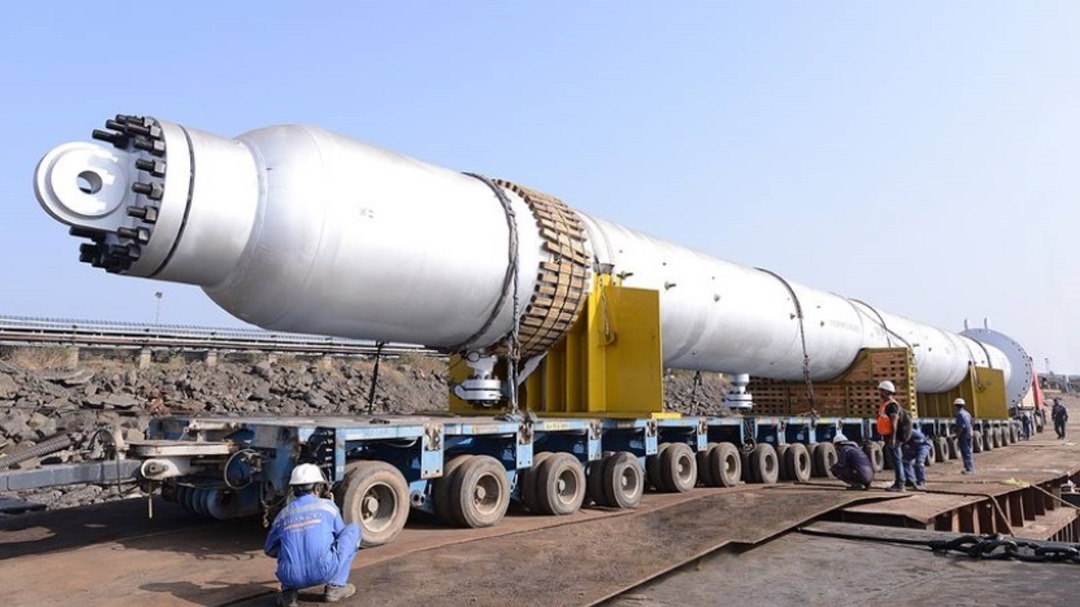16MO3 Steel Plate
The 16MO3 steel plate is one of the most widely used heat-resistant alloy steels, produced according to the European standard EN 10028-2 and recognized in the German DIN system under number 1.5415. This standard guarantees stable mechanical properties at high temperatures and under challenging working conditions.

The unique characteristics of this plate, such as excellent resistance to hot corrosion, mechanical durability at high temperatures, and reliability under high-pressure conditions, make it an ideal choice for sensitive industries. Its specific chemical composition, which includes controlled percentages of carbon, manganese, and the alloying element molybdenum, improves thermal performance and enhances resistance to creep and cracking at elevated temperatures.
This type of steel plate is widely used in the oil, gas, petrochemical, power generation, and chemical industries and plays a key role in the manufacturing of boilers, heat exchangers, pressure vessels, and other sensitive equipment. The high performance of the 16MO3 plate in high-temperature and stress-intensive environments makes it one of the most reliable options in industrial and infrastructure projects.
Chemical Composition of 16MO3 Plate
The controlled chemical composition of this steel plays a decisive role in its final properties. The table below shows the typical percentages of the main elements:
| Element | Approximate Weight % |
|---|---|
| Carbon (C) | 0.12 – 0.20٪ |
| Manganese (Mn) | 0.40 – 0.90٪ |
| Silicon (Si) | ≤ 0.35٪ |
| Molybdenum (Mo) | 0.25 – 0.35٪ |
| Phosphorus (P) | ≤ 0.025٪ |
| Sulfur (S) | ≤ 0.010٪ |
The presence of molybdenum especially increases resistance to creep, scaling, and structural stability at high temperatures.
Mechanical Properties
The mechanical properties of 16MO3 plate may vary slightly based on thickness and heat treatment conditions but generally are as follows:
| Property | Approximate Value |
|---|---|
| Tensile Strength (MPa) | 440 – 590 |
| Yield Strength (MPa | )≥ 220 |
| Elongation (%) | Minimum 22% |
| Heat Resistance | Up to approximately 500–600°C |
| Toughness (KV at low temp) | ≥ 27J at -20°C |
Advantages of 16MO3 Plate
- Excellent heat resistance: Suitable for long-term use in high-temperature environments.
- High pressure tolerance: Stable metallurgical structure performing well in pressure equipment.
- Good weldability: Compatible with various welding methods with controlled preheating.
- Resistance to creep and thermal cracking: Especially critical in manufacturing boilers and heat exchangers.
- Good machinability: Cutting and forming processes can be done with standard equipment.
Applications of 16MO3 Plate in Various Industries
Due to its high resistance to heat and pressure, 16MO3 is used extensively in industrial equipment such as:
- Industrial boilers: Handling high heat and severe steam pressure.
- Reactors and heat exchangers: Efficient heat transfer and corrosion resistance at elevated temperatures.
- Pipelines in refineries: For transporting hot or corrosive fluids.
- Pressure vessels: In petrochemical and power generation industries.
Industrial furnaces and heat treatment equipment.
Difference Between 16MO3 and Other Steel Grades
Compared to common carbon steels like A516 Gr 70, 16MO3 offers significantly higher technical capabilities under high temperatures and pressures.
features of this grade is its high resistance to creep and thermal cracking, which is critically important for equipment under pressure and elevated temperature. While steels like A516 are mainly designed for general pressure applications, 16MO3 is specifically developed for use in severe thermal conditions.
On the other hand, 16MO3 differs from wear-resistant steels such as Hardox. Hardox plates are designed for resistance to abrasion, impact, and physical wear and are mostly used in mining, construction, and heavy machinery industries. In contrast, 16MO3 has a different alloy composition focused on maintaining mechanical properties at high temperatures and thermal working conditions. Therefore, choosing this grade, especially in petrochemical, power plant, and chemical industries, is mainly based on the need for long-term heat and pressure endurance and structural stability.
SSAB STEEL SAZEH Company, as a specialized supplier of alloy, stainless, and heat-resistant steel plates in Iran, leverages years of experience and direct relations with reputable foreign manufacturers, including Chinese companies. This enables the supply of high-quality 16MO3 plates with competitive pricing and fast delivery to the Iranian market. The company is ready to cooperate with various industries such as oil, gas, petrochemical, power generation, and machinery manufacturing by providing continuous and specialized supply of various industrial steel plates.